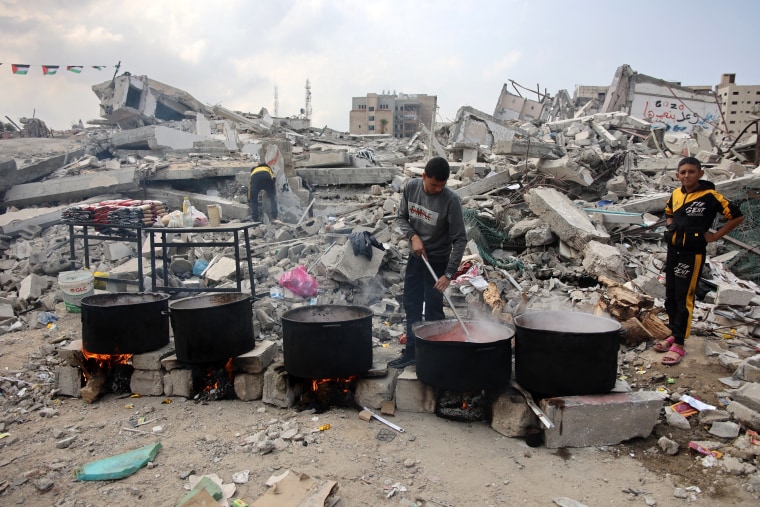Sirens sounded in central and northern Israel Saturday and the Israeli military continued to pummel Lebanon and Gaza, as cease-fire talks held this week yielded little hope of ending hostilities on the ground.
Northern Gaza, already the most heavily destroyed and isolated part of the strip, has been subjected to a renewed weekslong offensive by the Israel Defense Forces, driving the area to a situation the United Nations calls “apocalyptic.”
On Saturday, Israel said its air force had struck “more than 120 terror targets belonging to both Hamas and Hezbollah,” in Gaza and Lebanon over the past day. The Israeli military bombed targets in Beirut’s densely-populated southern suburbs overnight after warning residents to evacuate. It was the first time in several days that the area, a Hezbollah stronghold, had been hit.
The Lebanese Health Ministry said 52 people were killed by the Israeli strikes, and 72 injured across the country on Friday. On Saturday Gaza’s health ministry said 55 people were killed and 192 injured by Israel over the previous 24 hours.

Meanwhile, Iran’s Supreme Leader threatened Israel and the United States on Saturday, saying that they would “definitely receive a tooth-breaking response for what they are doing against Iran” and its proxies.
In Israel, a rocket fired from Lebanon hit a residential building in the city of Tira, about 15 miles northeast of Tel Aviv, on Saturday, injuring 11 people, according to Magen David Adom, Israel’s emergency services.
Video shot by news agency Reuters at the scene of the strike shows a low-rise building with much of the wall missing from the top floor and cars damaged by falling debris.
“A female in her 30s and a 17-year-old male suffered multiple injuries from shrapnel; they were fully conscious. We also evacuated further casualties all suffering from shrapnel wounds and cuts from glass shards,” Lior Silberberg, an MDA paramedic, said in a statement.
Warning sirens sounded in multiple locations in Israel on Saturday morning as the Israeli military said it was tracking “several suspicious aerial targets” from Lebanon, as Hezbollah confirmed firing several missile barrages at targets in Israel.
Israel also said it had successfully intercepted three drones over the Red Sea.
U.S. officials had been criss-crossing the Middle East this week trying to push for cease-fire deals that might bring some relief to the region.
CIA Director Bill Burns was in Cairo on Thursday where he met with Egyptian President Abdel Fattah el-Sisi and Egyptian intelligence chief Hassan Rashad. An Egyptian readout of the meeting said they discussed “ways to advance negotiations towards a ceasefire and the exchange of captives.”
Separately, Brett McGurk and Amos Hochstein, two senior American officials, traveled to Lebanon and Israel to try and hammer out a cease-fire that would calm tensions between the two neighbors.
On Wednesday, Lebanese caretaker Prime Minister Najib Mikati expressed hope that a deal could be announced soon, but by Friday Reuters reported that Mikati was blaming “Israeli stubbornness” for standing in the way of an agreement.
Following his meeting with McGurk and Hochstein on Thursday, Israeli Prime Minister Benjamin Netanyahu’s office issued a summary of the meeting that said that the main focus for Israel was its “ability and determination to enforce the agreement and thwart any threat to its security from Lebanon, in a way that will return our residents safely to their homes.”
For months, all sides have repeatedly blamed each other for standing in the way of progress on the negotiations.
Adding to the regional tensions, Iranian Supreme Leader Ayatollah Ali Khamenei said in televised remarks on Saturday, that Israel and the United States “will receive a tooth-breaking response for what they are doing against Iran and the Resistance Front,” referring to Iranian proxies in the Middle East.
It’s the latest sign that Iran may retaliate following Israel’s strikes on the country last Saturday.
General Mohammad Naeini, a spokesperson for the Islamic Revolutionary Guard Corps, promised “a decisive and strong response,” adding “The response will be beyond the enemy’s comprehension, strategic, and powerful,” according to the semi-official Fars news agency.
In a joint letter released on Friday, 15 heads of U.N. and humanitarian organizations called for aid access to northern Gaza, describing the situation there as “apocalyptic” and saying, “the entire Palestinian population in North Gaza is at imminent risk of dying from disease, famine and violence.”

Andrew Jones
Andrew Jones is a senior desk editor.








